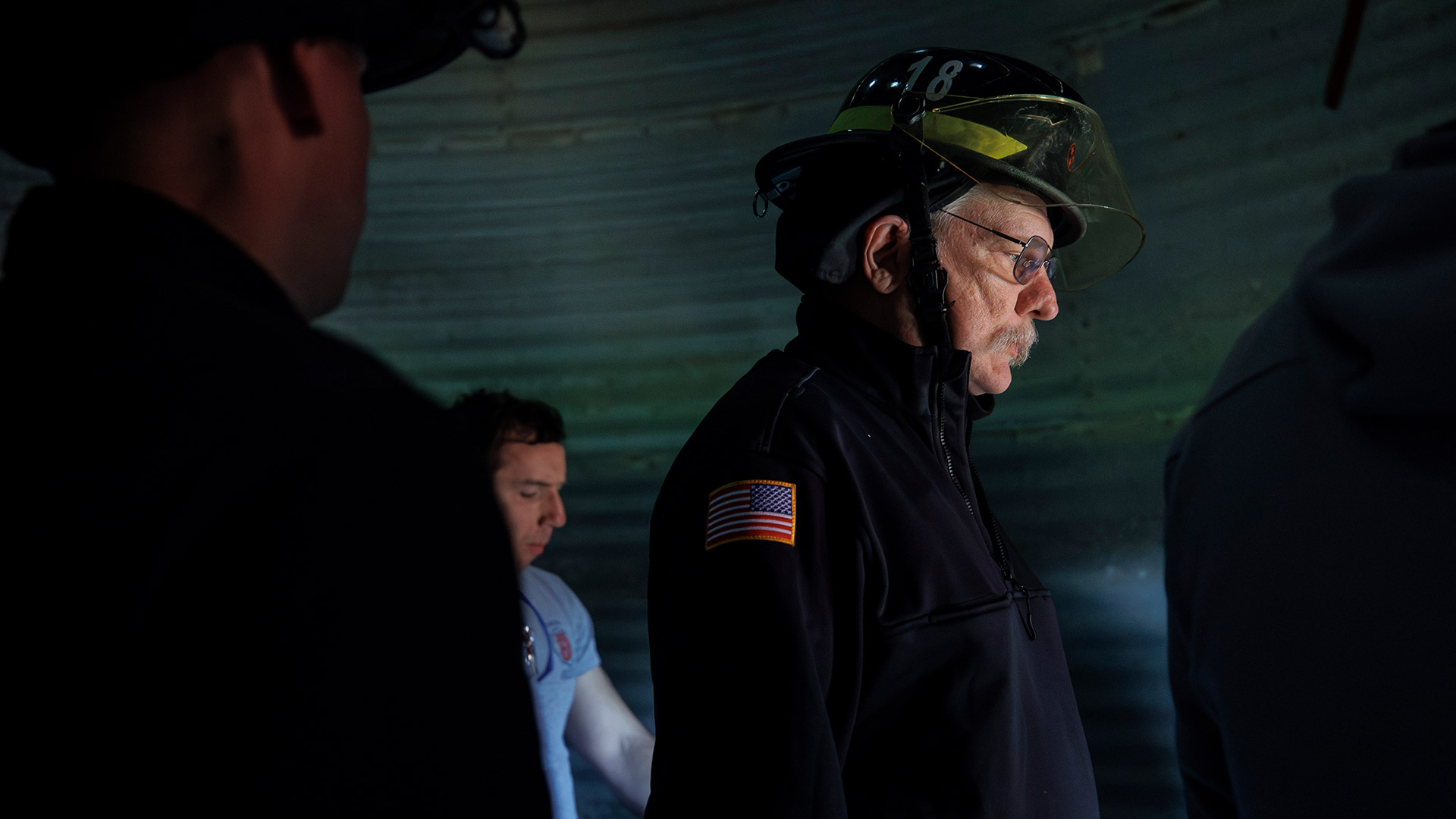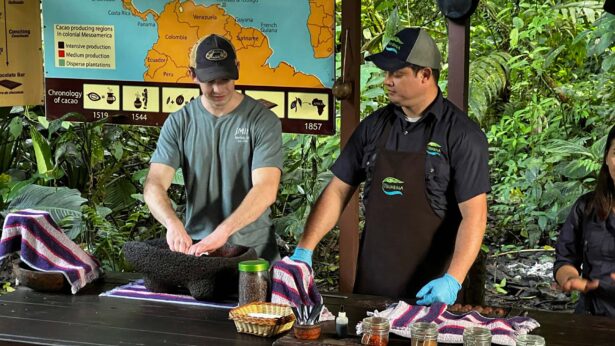Listen to this story
Carla Corum grew up on a farm in Lawrence County and wanted her children to have a chance to enjoy the things she did.
As an annual summer trip, Corum traveled with her 5-year-old son, Hudson, and his older sister, Josie, from their home in Idaho to visit her Tennessee family in June 2018.
“Hudson loved to farm,” she says. He was a huge fan of big green John Deere equipment and was excited that a family friend on a nearby farm let him ride in the combine for a few hours one day. “I don’t know how he contained him,” Corum says, laughing. “He said he ate a lot of candy.” One evening, Hudson swam in the cold creek beside a peaceful area where his family spent many summer nights around a campfire.
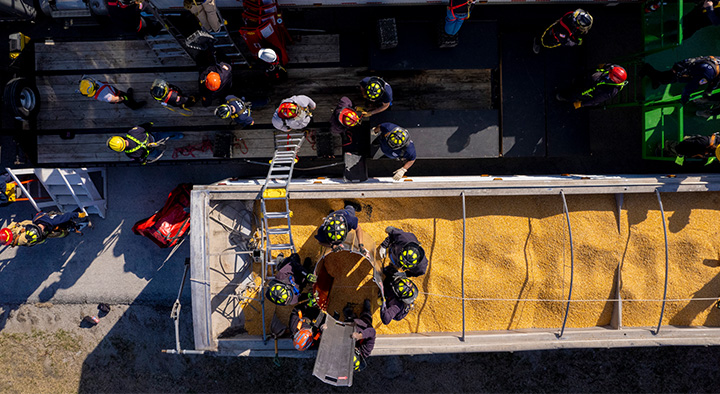
The next day, Hudson was in the grain bin with his uncle, Will Hudson, and two friends cleaning it out when he got entangled in the sweep auger at the bottom of the bin.
Ethridge Fire Chief Nathan Keeton was among the first responders who arrived on the scene. “He was talking to us when we got there,” Keeton says.
But Hudson could not be saved.

The entire community showed up in one way or another for the family after the accident. Farmers even lined up their John Deere equipment along the road as the family drove to the memorial service.
Grain bin accident prevention and training for farmers and rescue personnel was very limited in Tennessee at the time of Hudson’s death. Through the work of his family and partnerships among organizations, government agencies and businesses, safety training has grown and continues to grow.
“When someone close to you dies, you can react by cocooning yourself or you can choose to be helpful,” says Corum (UT Knoxville ’96, ’98). “We try to be proactive and help others. That is our way to honor Hudson.”
Tennessee Grain Bin Safety and Rescue Awareness Training, a partnership between Tennessee AgrAbility, a UT and Tennessee State University Extension program, and the Tennessee Association of Rescue Squads, was first held in 2020. Since then more than 500 participants—including farmers, producers, UT Extension agents and rescue personnel, many of whom are volunteers in rural communities—have gone through the training.
The training fee is sponsored by the Tennessee Department of Agriculture, Farm Credit Mid-America and the Goddard Family Memorial Endowment, which was established in memory of James Swann Goddard and William H. Goddard, brothers from Dandridge, who died in farm accidents in 1974 and 1988, respectively.
Farm Bureau offices in many counties and other organizations have donated more than $217,000 in rescue equipment like turtle tubes and the Great Wall of Rescue system, both used in grain-entrapment accidents, to fire departments, county EMS and other first responders.
Lawrence County rescuers and farmers participated in a 2022 training. The rescuers who responded to the 2018 accident were leery of taking part in a simulation.
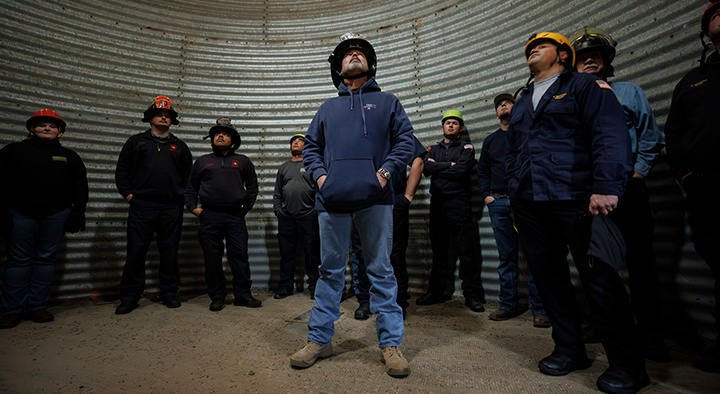
“They were in the bin with the boy. You could see the (emotional) scars. Several of the guys said, ‘We are not going into an empty grain bin,’” recalls Brian Robinson, state training coordinator for the Tennessee Association of Rescue Squads.
But they went in anyway.
As the training progressed in and around the grain bins, “They didn’t want to come out of the bin when asked to take a break. That was their time to finally confront the tragic event from 2018 and deal with those emotions and fears,” Robinson says.
At those trainings, Hudson’s story is told as a reminder for farmers and rescue personnel. Hudson’s family has provided decals that are affixed to the side of grain bins that call out the dangers and mention Hudson by name. There are other decals with art depicting Hudson’s Heart—a yellow heart with a green border like the colors of the John Deere equipment Hudson loved—that adorn rescue trucks and the new grain bin safety trailer in Lawrence County. A new rescue vehicle for the Ethridge Fire Department is called “Hudson’s truck” in his memory.
The training sessions teach first responders about farm equipment and how certain machines work, and they explain to both farmers and first responders how people can be injured or trapped, how to rescue a person and how to prevent accidents.
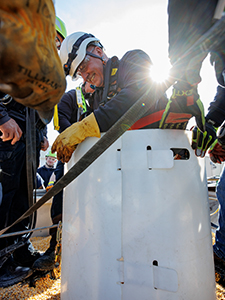
Keeton, the fire chief, says the training has made a huge difference since that day in 2018 when the responders did not know what to do in a grain bin or with that particular farm equipment.
“Never seen it. Never been around it,” Keeton says. Asked what aspects of the training have been the most helpful, he simply answers, “Everything.”
Farming is a dangerous profession. Statistics on the number of grain-bin accidents are hard to come by and can be skewed because they often happen on family farms and are not required to be reported to regulatory agencies. It is the fierce independence of farmers that often leads to accidents.
“We are stubborn. We get in a hurry and make mistakes,” says Joetta White, who coordinates the training for Tennessee AgrAbility and often helps on her family’s farm.
Lawrence County, located in Middle Tennessee along the Alabama border, is flat and well suited for growing large swaths of wheat, corn and soybeans. “Farming is the main economic driver in the county,” says Calvin Bryant, director of the Lawrence County UT Extension office. Grain bins are a common sight, and he says the harvest was so good this year that some farmers ran out of space to store their grain and corn.
Grain bins, or silos, in use today can be two to three stories tall with wide rounded tops and ladders on the inside and outside. Doors on the side at ground level and hatches up top provide access. A long, grooved auger, like a giant screw, at the bottom rotates to pick up and lift out the grain to empty it into a truck.
Sometimes the grain, especially if stored while wet, can form into clumps around the auger or form a bridge above. Farmers might go inside a bin to break up the clumps or bridge, but when doing so, the grain can avalanche and flow into the void underneath, quickly trapping a farmer like quicksand. Once that happens, help needs to arrive quickly to prevent suffocation. Because of the force of the grain, a person cannot just be pulled out by a rope.
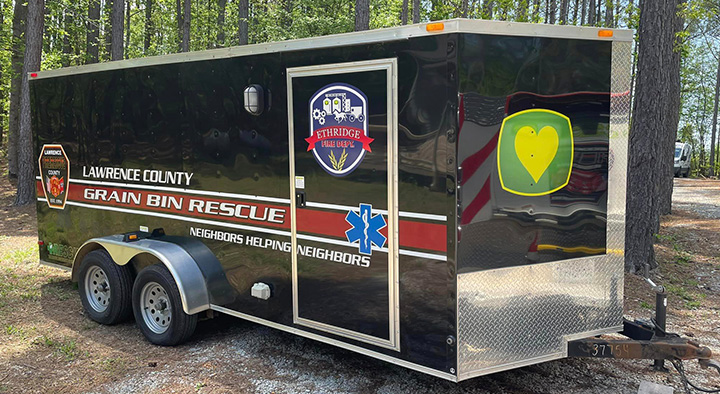
On a pleasant afternoon in November 2023, the call came that a Lawrence County farmer was trapped in his grain bin and sinking fast into the dry corn. Firefighters, police and other emergency crews jumped into action. Five rescuers went into the bin with harnesses and ropes to keep them from falling into the quicksand-like mountain of corn. Carefully, they sunk a bendable plastic sheath called a turtle tube around the farmer to keep more corn from pressing on him. He was already up to his neck, pressure pounding on his body as he took each breath. They dug out corn around him to make room for the Great Wall of Rescue, which is a set of heavier and stiffer shields that go around the entrapped person.
Observing from outside the grain bin, Keeton called two of the people who helped provide the training the rescuers were implementing—Robinson from the Tennessee Association of Rescue Squads and White with Tennessee AgrAbility.
“We have a grain bin rescue right now,” Robinson recalls Keeton saying to him over Facetime. “He’s coming out alive.”
That last part is the most critical piece of information—not just for the farmer but for everyone involved in the rescue.
“Everyone who worked the scene had been trained in grain bin rescue, and it paid off,” White says.
While the rescue was underway, word started to spread throughout the tight-knit community that someone was trapped in a grain bin. A call came to the office of Nutrien, an agricultural chemical supplier, where Will Hudson is the manager. “You think the worst,” he says. And then he heard the news that neither the farmer nor the rescuers were injured. “That fellow owes his life to that training,” he says.
After the 2018 accident, Will Hudson replaced the auger in his bin with a belt system that does not need anyone to go inside the bin to clean or scrape down the sides.
The family has been trying to find ways to work with companies to incentivize farmers to change their equipment or retrofit it to include safeguards, but the training and safety programs have brought the most dividends so far.
“We can’t bring Hudson back,” Carla Corum says. “But these success stories are helpful.”
Tennessee AgrAbility is a U.S. Department of Agriculture program of UT and Tennessee State University Extension, a unit of the statewide UT Institute of Agriculture, and the STAR Center, the assistive technology nonprofit partner. Tennessee AgrAbility, founded in 1994, educates and assists farmers to enhance their quality of life and preserve the livelihoods of farm families touched by disability or physical tragedy. In addition to the grain-bin safety training, Tennessee AgrAbility and UT Extension offer many seminars, workshops and programs for farmers. For instance, the Farm Family Health and Wellness Program includes a segment about farm safety and injury management.
For more information about Tennessee AgrAbility, visit agrability.tennessee.edu.
